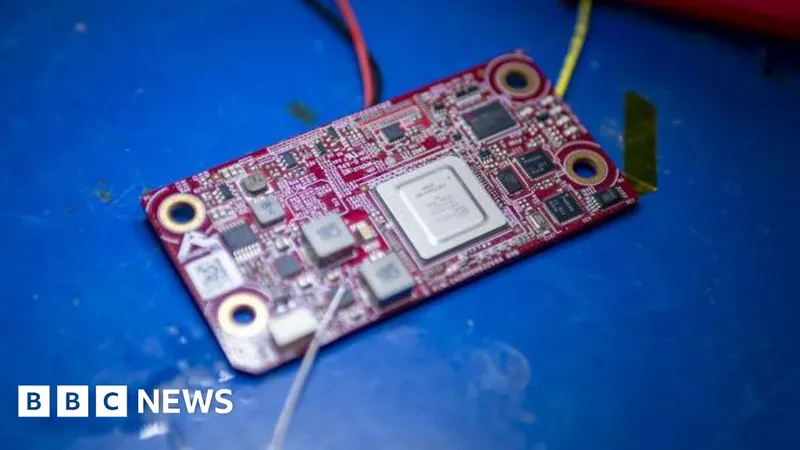
Controversial US Ban on AI Chip Exports Sparks Outcry Among Tech Giants
2025-01-13
Author: Charlotte
Controversial US Ban on AI Chip Exports Sparks Outcry Among Tech Giants
In a significant shift in policy, the United States has announced stringent new restrictions on the export of advanced artificial intelligence (AI) technologies and computer chips, affecting numerous countries beyond its traditional adversaries. This strategy is part of the Biden administration's effort to ensure that "the world's AI runs on American rails," aiming to prevent so-called "malicious actors" from harnessing these technologies against U.S. interests.
The recent announcement comes just days before President Biden’s term concludes and has triggered a wave of backlash from major tech companies within the U.S. Many of these firms, including industry leader Nvidia, fear that such limitations will unwittingly bolster foreign competitors, particularly in the rapidly evolving AI sector. Nvidia's representatives stated that the restrictions would not mitigate any threats but would rather undermine America's global competitiveness and innovation edge.
Why Are These Restrictions Happening?
Federal officials, including those from the U.S. Commerce Department, argue that advanced AI technologies could potentially lead to severe national security risks. These include the development of weapons of mass destruction, enhancing offensive cyber capabilities, and facilitating massive human rights violations through surveillance. They caution that inappropriately timed or improperly controlled AI could spell disaster.
Under the proposed rules, countries like China, Russia, and Iran—which already face rigorous export controls—would see even tighter restrictions. Export limits would now be applied to a wider array of countries, with U.S. technology firms required to obtain authorizations for sales. However, key allies such as the UK will be exempt from these limitations, reflecting a strategic prioritization of U.S. relationships.
The Response from Tech Leaders
Critics of the new regulations are not holding back. Many argue that by tightening market controls, the administration risks losing its position as a leader in technological innovation. Jonathan Kewley, a co-head at Clifford Chance, believes that the impending Trump administration is likely to roll back these restrictions, predicting that a major focus would shift towards fostering innovation rather than restricting competition.
Adding to this perspective, the Information Technology and Innovation Foundation (ITIF) posits that the U.S. should concentrate on competitive strategies instead of containment. According to ITIF's vice president, Daniel Castro, the ultimatum posed by the U.S. may push numerous nations into alliances with China, particularly if they feel cornered and in need of the AI technologies crucial for their economic development.
What Lies Ahead?
The regulations are currently in a 120-day comment period before implementation, allowing room for amendments based on public feedback. Advocates for a more flexible approach have suggested that the U.S. could benefit from collaborative agreements with other nations, permitting safer access to essential AI innovations while preserving national security.
As the global race for AI supremacy heats up, the actions taken by the U.S. could have far-reaching implications not just for American firms but for the broader geopolitical landscape concerning technological advancement and international relations. Will this be a protective strategy for the U.S. or a misstep that could redefine the global AI ecosystem? Only time will tell.



 Brasil (PT)
Brasil (PT)
 Canada (EN)
Canada (EN)
 Chile (ES)
Chile (ES)
 Česko (CS)
Česko (CS)
 대한민국 (KO)
대한민국 (KO)
 España (ES)
España (ES)
 France (FR)
France (FR)
 Hong Kong (EN)
Hong Kong (EN)
 Italia (IT)
Italia (IT)
 日本 (JA)
日本 (JA)
 Magyarország (HU)
Magyarország (HU)
 Norge (NO)
Norge (NO)
 Polska (PL)
Polska (PL)
 Schweiz (DE)
Schweiz (DE)
 Singapore (EN)
Singapore (EN)
 Sverige (SV)
Sverige (SV)
 Suomi (FI)
Suomi (FI)
 Türkiye (TR)
Türkiye (TR)
 الإمارات العربية المتحدة (AR)
الإمارات العربية المتحدة (AR)